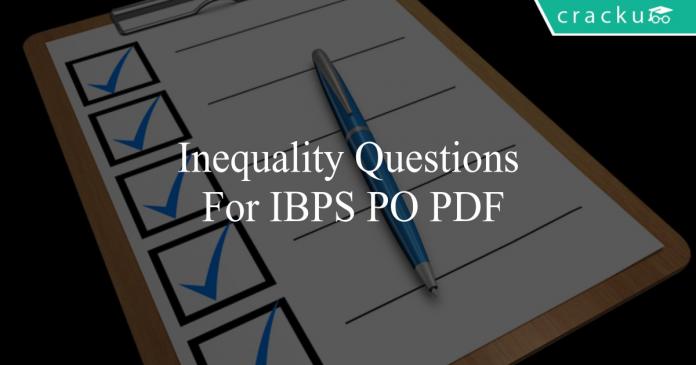Download Inequality Questions For IBPS PO PDF
Take a free mock test for IBPS PO
Download IBPS PO Previous Papers PDF
Instructions
In the following question, the relationship between different elements is given along with two conclusions. Find out the conclusion which definitely follows from the given relationship and choose the option accordingly.
Question 1: $ X>Y=Z ; S>Q>R ; Z>P=Q $
Conclusion I : $ X>Q$
Conclusion II: $ S=Z $
a) Only conclusion I follows
b) Only conclusion II follows
c) Both the conclusions follow
d) Either conclusion I or conclusion II follows
e) None of the conclusions follows
Question 2: $A \geq H \geq L \geq Q; F > G; Q = U = Y > F;$
Conclusion I : $H \geq Y $
Conclusion II: $Q < A$
a) Only conclusion I follows
b) Only conclusion II follows
c) Both the conclusions follow
d) Either conclusion I or conclusion II follows
e) None of the conclusions follows
Question 3: $E = F \geq T \geq R; Q > J = O; Q < Z < R$
Conclusion I : $Z < F$
Conclusion II: $T >O$
a) Only conclusion I follows
b) Only conclusion II follows
c) Both the conclusions follow
d) Either conclusion I or conclusion II follows
e) None of the conclusions follows
IBPS PO Quant Formulas & Shortcuts
Question 4: $F \geq K > Z \geq P; W > V \geq D; P = W$
Conclusion I : $Z \geq D$
Conclusion II: $F\leq V$
a) Only conclusion I follows
b) Only conclusion II follows
c) Both the conclusions follow
d) Either conclusion I or conclusion II follows
e) None of the conclusions follows
Question 5: $X < Y \leq Z< W; M > N \geq W; X > K$
Conclusion I : $N > X$
Conclusion II: $Y < M$
a) Only conclusion I follows
b) Only conclusion II follows
c) Both the conclusions follow
d) Either conclusion I or conclusion II follows
e) None of the conclusions follows
Instructions
In the following question, the relationship between different elements is given along with two conclusions. Find out the conclusion which definitely follows from the given relationship and choose the option accordingly.
Question 6: $X < Y = Z \leq G; C > B = D; D > G$
Conclusion I : $Z < B$
Conclusion II: $C > Y$
a) Only conclusion I follows
b) Only conclusion II follows
c) Both the conclusions follow
d) Either conclusion I or conclusion II follows
e) None of the conclusions follows
Question 7: $A > H \geq L \geq Q; F > G; Q > U = Y > F;$
Conclusion I : $H \geq F$
Conclusion II: $Q < A$
a) Only conclusion I follows
b) Only conclusion II follows
c) Both the conclusions follow
d) Either conclusion I or conclusion II follows
e) None of the conclusions follows
Question 8: $H = W \geq G \geq K; J > B = O; J < P < K$
Conclusion I : $P < W$
Conclusion II: $G \geq O$
a) Only conclusion I follows
b) Only conclusion II follows
c) Both the conclusions follow
d) Either conclusion I or conclusion II follows
e) None of the conclusions follows
Question 9: $A > H > Y \geq T; O > L = X; T = O$
Conclusion I : $Y \geq X$
Conclusion II: $A \leq L$
a) Only conclusion I follows
b) Only conclusion II follows
c) Both the conclusions follow
d) Either conclusion I or conclusion II follows
e) None of the conclusions follows
Question 10: $A < B = C \leq D; O > E = D; A > P$
Conclusion I : $E > A$
Conclusion II: $B < O$
a) Only conclusion I follows
b) Only conclusion II follows
c) Both the conclusions follow
d) Either conclusion I or conclusion II follows
e) None of the conclusions follows
Instructions
In the following question, the relationship between different elements is given along with two conclusions. Find out the conclusion which definitely follows from the given relationship and choose the option accordingly.
Question 11: $X > Y \leq Z$ ; $Y= P \geq Q$ ; $Q= R> S$
Conclusion I : $X>S$
Conclusion II: $Z\geq R$
a) Only conclusion I follows
b) Only conclusion II follows
c) Both the conclusions follow
d) Either conclusion I or conclusion II follows
e) None of the conclusions follows
Question 12: $X=Y\geq Z ; Z=A< B ; Q < P \leq Z$
Conclusion I : $ X>P$
Conclusion II: $B> Q$
a) Only conclusion I follows
b) Only conclusion II follows
c) Both the conclusions follow
d) Either conclusion I or conclusion II follows
e) None of the conclusions follows
Question 13: $L\leq M\geq N; L=X\geq Y; P<N>Q$
Conclusion I : $M>P$
Conclusion II: $M\geq Y$
a) Only conclusion I follows
b) Only conclusion II follows
c) Both the conclusions follow
d) Either conclusion I or conclusion II follows
e) None of the conclusions follows
Question 14: $P<Q>R , P>X>Y , R>L>M$
Conclusion I: $Y<Q$
Conclusion II: $P=R$
a) Only conclusion I follows
b) Only conclusion II follows
c) Both the conclusions follow
d) Either conclusion I or conclusion II follows
e) None of the conclusions follows
Question 15: $I=J\leq K; J\geq A=B; B>C>D$
Conclusion I : $K \geq B$
Conclusion II: $J \geq B$
a) Only conclusion I follows
b) Only conclusion II follows
c) Both the conclusions follow
d) Either conclusion I or conclusion II follows
e) None of the conclusions follows
IBPS PO Previous Papers (Download Pdf)
Answers & Solutions:
1) Answer (A)
$X>Y=Z>P=Q$. Thus, $X>Q$. Hence, Conclusion 1 follows.
No relation can be established between S and Z. Thus, Conclusion 2 does not follow.
Hence, option A is the correct answer.
2) Answer (A)
$H \geq L \geq Q=U=Y $. Thus, $H \geq Y $. Hence, conclusion 1 follows
$A\geq H \geq L \geq Q$. Thus, $A\geq Q$. Hence, conclusion 2 does not follow.
Hence, option A is the correct answer.
3) Answer (C)
$ F\geq T\geq R>Z $. Thus, $ Z>F $. Hence, conclusion 1 follows.
$ T\geq R>Z>Q>J=O$. Thus, $T>O$. Hence, conclusion 2 follows.
Thus, both the conclusion follows.
Hence, option C is the correct answer.
4) Answer (E)
$Z\geq P=W>V\geq D$. Thus, $Z>D$. Hence, conclusion 1 does not follow
$F\geq K > Z\geq P=W>V$. Thus, $F>V$. Hence, conclusion 2 does not follow.
Thus, none of the conclusion follows.
Hence, option E is the correct answer.
5) Answer (C)
$N\geq W>Z\geq Y>X$. Thus, $N>X$. Hence, conclusion 1 follows.
$M>N\geq W>Z\geq Y$. Thus, $M>Y$. Hence, conclusion 2 follows.
Thus, both the conclusions follows.
Hence, option C is the correct answer.
6) Answer (C)
From $X < Y = Z \leq G$; and $D > G$; we can say that $D > G \geq Z = Y > X$.
From $D > G \geq Z = Y > X$ and $C > B = D$ we can say that $C > B = D > G \geq Z = Y > X$.
We can see that both the conclusions are true. Therefore, option C is the correct answer.
7) Answer (B)
From $A > H \geq L \geq Q$; and $Q > U = Y > F$; we can say that $A > H \geq L \geq Q > U = Y > F$.
From $A > H \geq L \geq Q > U = Y > F$ and $F > G$ we can say that $A > H \geq L \geq Q > U = Y > F > G$.
In conclusion I, it should be $H > F$, hence conclusion I is incorrect.
We can see that only conclusion II is true. Therefore, option b is the correct answer.
8) Answer (A)
From $H = W \geq G \geq K$; and $J < P < K$; we can say that $H = W \geq G \geq K > P > J$.
From $H = W \geq G \geq K > P > J$ and $J > B = O$ we can say that $H = W \geq G \geq K > P > J > B = O$.
In conclusion II, it should be $G > O$, hence conclusion II is incorrect.
We can see that only conclusion I is true. Therefore, option A is the correct answer.
9) Answer (E)
From $A > H > Y \geq T$; and $T = O$; we can say that $A > H > Y \geq T = O$.
From $A > H > Y \geq T = O$ and $O > L = X$ we can say that $A > H > Y \geq T = O > L = X$.
In conclusion I, it should be $Y > X$, hence conclusion I is incorrect.
In conclusion II, it should be $A > L$, hence conclusion II is incorrect.
We can see that no conclusion I is true. Therefore, option E is the correct answer.
10) Answer (C)
From $A < B = C \leq D$; and $A > P$; we can say that $D \geq C = B > A > P$.
From $D \geq C = B > A > P$ and $O > E = D$ we can say that $O > E = D \geq C = B > A > P$.
We can see that both the conclusions are true. Therefore, option C is the correct answer.
11) Answer (C)
$X>Y=P\geq Q=R> S$. Hence, $X>S$. Therefore, conclusion 1 follows.
$Z\geq Y = P \geq Q=R$ i.e. $Z\geq R$.Therefore, conclusion 2 follows.
Hence, option C is the correct answer.
12) Answer (B)
$X=Y\geq Z\geq P $ i.e. $X\geq P$. Hence, conclusion I does not follow.
$B>A=Z\geq P>Q $ i.e. $B>Q$. Hence, conclusion II follows
Hence, option B is the correct answer.
13) Answer (C)
$M\geq N>P $ i.e. $M>P$. Therefore, conclusion 1 follows.
$ M\geq L = X\geq Y$ i.e. $M\geq Y$. Therefore, conclusion 2 follows
Hence, option C is the correct answer.
14) Answer (A)
$Q>P>X>Y$ i.e. $Q>Y$.Therefore, conclusion 1 follows.
No relation between P and R can be established. Thus, conclusion 2 does not follow.
Hence, option A is the correct answer.
15) Answer (C)
$K\geq J\geq A=B$ i.e. $K\geq B$.
$K\geq J\geq A=B$ i.e. $J \geq B$. Therefore both the conclusions follow.
Hence, option C is the correct answer.





